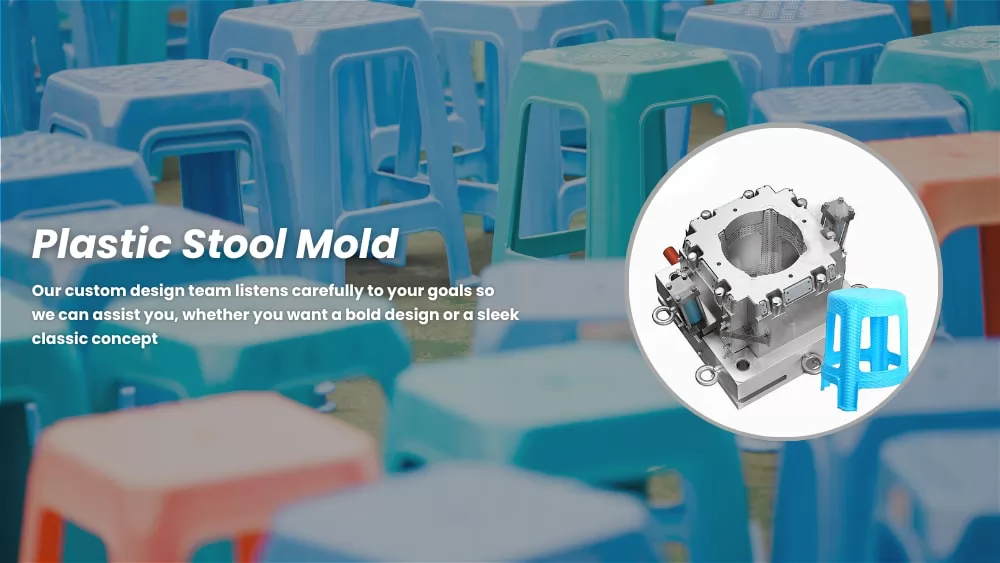
Stool mold (also known as stool mould) is mainly used to produce various types of plastic stools. We are a professional manufacturer of plastic stool molds in China. Our services include prototyping, machining, sampling, trial runs, mass production and assembly.
What you can learn from this article:
- We Provide Plastic Stool Products
- Definition of Plastic Stool Mold
- Advantages of Our Plastic Stool Mold
- Benefits of Using Molds to Produce Plastic Stools
- Application Scenarios of Plastic Stool Molds
- How to Check the Quality of Plastic Stool Molds
- What Is the Service Life of Plastic Stool Mold?
- About Recycling of Plastic Stool Molds
- Our Process of Making Plastic Stool Molds
- FAQs When Purchasing Stool Molds
- Successfully Delivered Plastic Stool Mold Mould Case
- The Best Plastic Stool Mold Manufacturer Around You
We Provide Plastic Stool Products
If you're searching for a trustworthy source of plastic stool mold products, you've come to the right place. Our expertise lies in delivering premium-grade and cost-effective solutions tailored to suit diverse customers' needs.
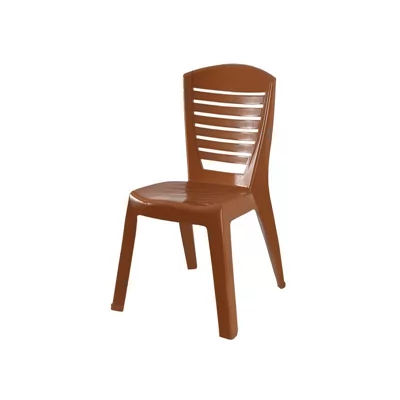
Plastic Stool
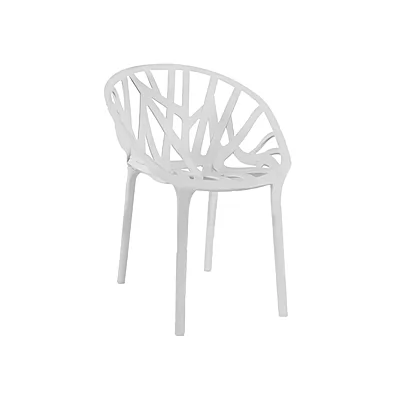
Plastic Stool
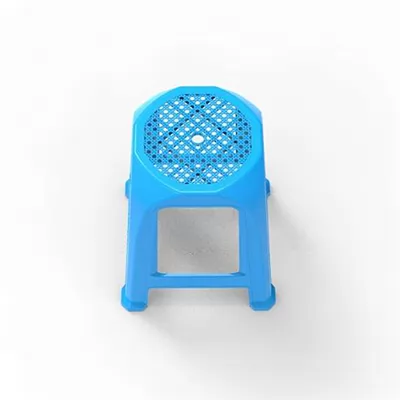
Plastic Stool
Definition of Plastic Stool Mold
A plastic stool mold refers to a specialized tool or die used in the manufacturing process to produce plastic stools. It is a precision-made mold designed to shape and form molten plastic material into a specific stool design. These molds are crucial components in the injection molding or blow molding processes used to create plastic stools.
Plastic stool molds are typically made from durable materials such as steel, aluminum, or composite materials. These materials were chosen for their strength, durability and ability to withstand the high pressure and temperature involved in the molding process.
The mold design is custom-made to match the desired shape, size and functionality of the plastic stool. It consists of two or more parts, including a cavity (or cavities) that forms the shape of a stool and a core that forms the inner structure.
Plastic stool molds can be complex, with various mechanisms such as ejector pins, cooling channels, sliders, and vents. These components assist in the proper shaping, cooling and ejection of the molded stool.
Plastic stool molds play a vital role in the mass production of plastic stools, allowing manufacturers to efficiently and cost-effectively manufacture large quantities of consistent, high-quality stools
Advantages of Our Plastic Stool Mold
Below are the main reasons to choose our plastic table mould.
Customizable design
Our molds support customization services to meet various customer preferences, allowing the stool design to adapt to different target markets, regions or specific customer needs.
Custom designs can make your products stand out from your competitors and you can establish your own unique brand identity.
We have cutting-edge technology to meet your specific functional needs, such as ergonomic considerations, unique proportions or space-saving requirements. Make your products more practical and efficient, and be able to quickly adapt to changing design trends to ensure your products maintain their influence in the market.
Durable material
Our molds are made from durable materials that can withstand extended use and repeated molding cycles without significant wear and tear, ensuring consistent quality and precision in stool production over an extended period of time.
We hope to gain brand reputation through high quality. The use of durable materials can increase the service life of the product, while reducing adjustments and corrections in the production process, saving time and resources. I believe our quality can meet your expectations.
Affordable
We hope to attract a wider customer base through cost-effective prices. If you are a small business or start-up with a limited budget, you can also consider us.
We hope to achieve mutual benefit and win-win results through a small profit but quick turnover model, which we believe will also help us achieve long-term cooperation with our customers.
Benefits of Using Molds to Produce Plastic Stools

Molds ensure exact replication of the stool design, allowing consistency in size, shape and functionality across multiple units. This consistency leads to consistency in the final product.
Molds can achieve mass production and reduce unit production costs. Once the initial mold is created, it can be reused, optimizing production efficiency and reducing overall manufacturing expenses.
Molds can create a variety of stool designs, from simple to complex shapes, with different textures, patterns and finishes. They help achieve unique designs tailored to specific preferences or market needs.
The use of molds simplifies the production process and reduces the manufacturing time of each stool. Molds enable a faster, more efficient molding process, resulting in higher throughput of finished products in less time.
Well-maintained molds have a long service life and can continue to produce stools for an extended period of time without significant loss of quality or performance.
Application Scenarios of Plastic Stool Molds
Furniture Manufacturing: Plastic stool molds are widely used in the production of indoor and outdoor furniture stools to meet the needs of residential, commercial and hotel industries.
Home Use: These molds create stools suitable for everyday home use, providing an affordable and durable seating option for kitchens, bathrooms, gardens and other areas.
Public places: Plastic stools produced from molds are used in public places such as parks, schools, libraries and waiting areas because they are lightweight, durable and easy to maintain.
Industrial Settings: Stools made from plastic molds are practical in industrial settings, providing convenient seating for workers in factories, warehouses, laboratories and assembly lines.
Events and Entertainment Industry: Due to their portability and ease of operation, they are used as temporary seating solutions at events, concerts and parties.
Healthcare Facilities: Molded plastic stools are used in medical and healthcare facilities to provide patients, caregivers and medical professionals with a portable and hygienic seating option.
How to Check the Quality of Plastic Stool Molds

Visual Inspection: Visually inspect the mold surface for any obvious damage, wear or irregularities. Check for cracks, dents, or signs of corrosion that may affect mold performance.
Dimensional Inspection: Use precision measurement tools such as calipers, gauges, or rulers to inspect critical dimensions of mold components. Verify that mold dimensions meet specified design requirements.
Surface quality assessment: Check the surface finish of the mold. A smooth and uniform surface is essential for producing high-quality plastic stools. Look for any flaws or irregularities that may affect the appearance of the final product.
Functional testing: Functional testing is performed to ensure that all moving parts, slides and mechanisms within the mold operate smoothly and correctly. Check the ejection system, locking mechanism and cooling channels to ensure proper function.
Mold Alignment: Verify that all mold parts are properly aligned during assembly. Misalignment can cause defects in the molded stool. Check for any signs of misalignment or gaps between mold parts.
Material flow analysis:Conduct material flow analysis to ensure proper distribution of molten plastic within the mold cavity. Look for potential flow restrictions or areas of uneven filling that could cause molding defects.
Wear assessment:Evaluate mold components for wear, especially areas that experience high stress during the molding process. Check critical areas for signs of wear, corrosion or fatigue that could affect mold life
Cleaning and Maintenance: Make sure the mold is clean and free of any residue or contaminants that could affect the molding process. Follow a regular maintenance schedule to prevent buildup, corrosion, or damage to mold parts.
Make sure the mold is clean and free of any residue or contaminants that could affect the molding process.Follow a regular maintenance schedule to prevent buildup, corrosion, or damage to mold parts.
What Is the Service Life of Plastic Stool Mold?
The service life of plastic stool molds can vary greatly based on several factors:
Material quality: The material used to make the mold greatly affects its lifespan. High-quality materials, such as high-quality steel or durable alloys, can give molds a longer life than lower-grade materials.
Manufacturing Technology: The precision and expertise applied in the manufacturing process affects the durability of the mold. Molds manufactured using advanced machining technology and precision engineering tend to have a longer service life.
Maintenance and Care: Regular maintenance, cleaning and proper care can significantly extend the life of your plastic stool mold. Prompt maintenance, moving parts lubrication and preventive measures can help prevent wear and damage.
Mold design and complexity: The complexity of the mold design affects its service life. Simple molds with fewer moving parts are likely to last longer than highly complex molds that are subject to wear and tear.
Molding conditions: The environment in which the mold operates affects its life. Factors such as temperature, pressure and frequency of use can affect the wear of mold components.
While plastic stool molds have no set lifespan, well-maintained molds can often last thousands or even hundreds of thousands of molding cycles. Service life can range from a few thousand cycles to hundreds of thousands or more, depending on the factors mentioned above.
About Recycling of Plastic Stool Molds

Plastic stool molds are typically made from materials such as steel, aluminum or composites and are not typically recycled like the plastic products themselves. However, once these molds reach the end of their useful life or become obsolete due to wear and tear, they can undergo different recycling or repurposing processes:
Scrap Metal Recycling: The metal used to make the plastic stool molds, such as steel or aluminum, can be recycled as scrap metal. Recycling facilities can collect these metals, melt them down, and use them as raw materials to make other metal products.
Refurbishment and Reuse: In some cases, worn or obsolete molds can be refurbished, repaired, or repurposed for other manufacturing purposes. This process may involve refurbishing mold components or modifying them to meet different production needs.
Material recycling: Certain components of a mold, such as cooling channels or parts made from specific alloys, can be separated and reused in other manufacturing processes where their properties are beneficial.
While the plastic stool mold itself is not directly recycled as plastic material, the recycling or reuse of its constituent metals and components contributes to resource conservation and waste reduction within the manufacturing industry.
Our Process of Making Plastic Stool Molds
The manufacturing process of plastic table mold usually includes the following steps:
Design and Planning: The process begins with a thorough understanding of the stool design requirements. Engineers and designers create detailed 3D CAD (computer-aided design) models based on specified stool dimensions and features.
Material selection: Select appropriate mold manufacturing materials based on design specifications. Common materials include high-grade steel, aluminum alloys, or composites known for their durability and strength.
Machining and molding: Machining processes such as milling, turning, grinding and electrical discharge machining (EDM) are used to form mold parts. CNC (computer numerical control) machines are often used to achieve precise and complex mold designs.
Heat Treatment: Some molds undergo a heat treatment process to increase their hardness, durability, and wear resistance. Heat treatments such as tempering or hardening are used to improve material properties.
Assembly and Finishing: The mold parts are carefully assembled and assembled. Skilled technicians ensure proper alignment and accuracy during assembly. Surface finishing such as polishing or coating can be applied to achieve a desired texture or appearance.
Quality Control and Testing: Strict quality checks and inspections are conducted at all stages of mold manufacturing. This includes dimensional inspections, surface quality assessments and functional testing to ensure molds meet design specifications and quality standards.
Trial run and adjustments: Once the mold is assembled, a trial run is performed using test materials to produce fecal samples. Adjustments and fine-tuning are made to ensure the mold produces a high-quality stool that meets the expected specifications.
Deployment and Production: After successful testing and validation, the plastic stool mold is ready for deployment in the manufacturing process. Molten plastic material is injected or blown into a mold cavity under controlled conditions to produce a plastic stool.
Maintenance and life management: Develop a regular maintenance schedule to ensure longevity and optimal performance of your molds. Maintenance activities include cleaning, lubrication, repairs and regular inspections to prevent wear and extend the life of the mold.
The manufacturing process of plastic stool molds requires precision engineering, meticulous craftsmanship, and attention to detail at every stage to achieve precise and high-quality mold parts.
FAQs When Purchasing Stool Molds

Here are some common questions customers may have when purchasing table models:
Q1: Can you suggest a design proposal for the stool?
A: We are happy to design products and molds for you for free.
Q2: What types of files can you accept?
A: We can accept different types of files, such as DXF, DWG, IGS, IGES, STP, PRT, X_T, and PDF.
Q3: What kind of material do you use for mold trial and production?
Answer: PP, PC, PS, PE, HDPE, POM, PA6, PA66, PA6+GF, ABS, TPU, TPE, PVC, SMC, BMC,
Q4: How long is the lead time for the stool mold?
A: It all depends on the size and complexity of the mold. Usually, the delivery time is 15-45 days.
Q: Before shipping, how to ensure the quality of the stool mold?
A: We will provide you with a video of the details of the production process, including process reports, product dimensions, structure and surface details, packaging details, etc.
Successfully Delivered Plastic Stool Mold Mould Case
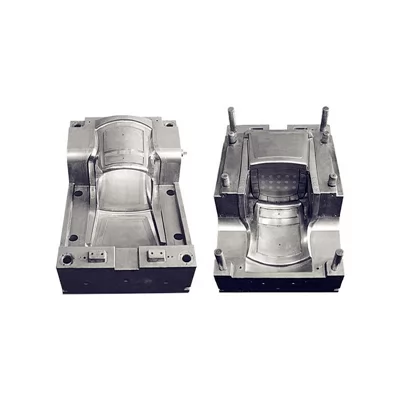
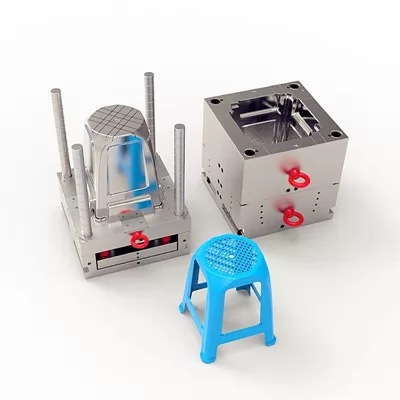
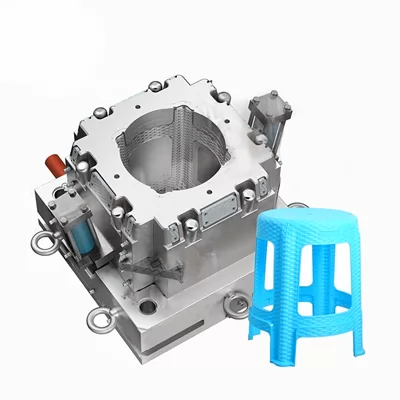
The Best Plastic Stool Mold Manufacturer Around You
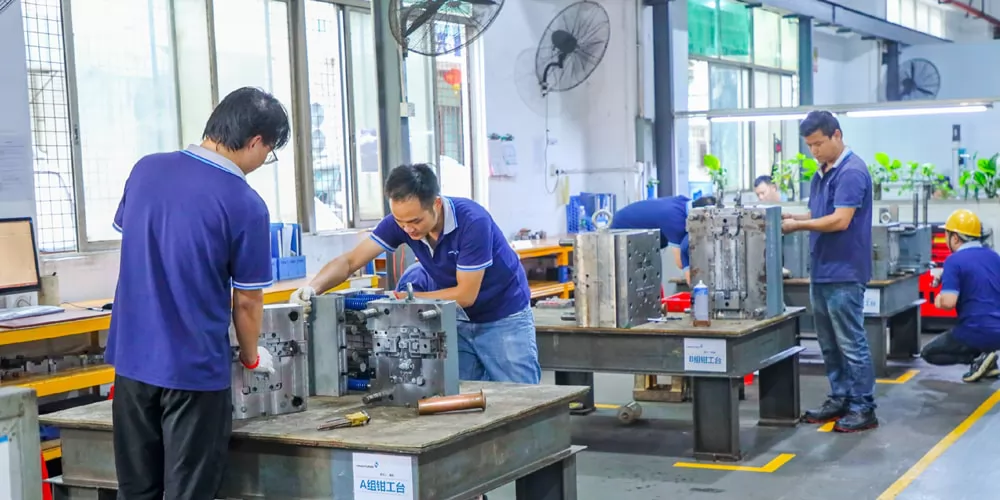
HingTung is a professional manufacturer and exporter of plastic stool mold in China. We can provide complete solutions for high-precision stool molds according to customers' ideas, from mold flow analysis, product design optimization, mold design improvement, plastic parts production, to ensure smooth surface and perfect assembly of stool products.
Our production base has passed TS16949, ISO 14001 and ISO 9001 certifications. You can fully trust our production sites, products and orders.
You May Be Looking for Other Plastic Molds
- Custom Plastic Table Molds
- Custom Plastic Crate Mold
- Custom Plastic Bucket Mould
- Custom Home Appliance Plastic Mould


